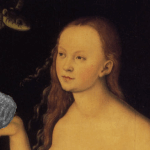Definition
noun
A form of inheritance wherein the traits of the offspring are maternal in origin due to the expression of extranuclear DNA present in the ovum during fertilization.
Overview
Some of the traits inherited by the offspring can be solely attributed to the genetic material transmitted by the mother to her offspring. It is because during the union of gametes the ovum retains its mitochondria. Mitochondria are organelles that contain their own set of genes. It is a popular notion that most of the mitochondria acquired by the offspring are of maternal origin. When a sperm fertilizes an ovum, only its nuclear genetic material contained within the head is allowed to combine with that of the ovum while its midpiece and tail (with comparatively fewer mitochondria) are lost or disintegrated. Hence, hereditary diseases associated with faulty mitochondrial DNA are said to be inherited solely from the mother. These traits are also described as maternal effects. However, recent studies indicate that paternal mitochondrial DNA somehow gets into the ovum and thus a faulty paternal mitochondrial DNA can also be passed on to the offspring, debunking the precept that mitochondrial DNA (and therefore mitochondrial diseases) are solely maternal in origin. Synonym: matroclinous inheritance. Compare: paternal inheritance. Mentioned in: extranuclear inheritance.






